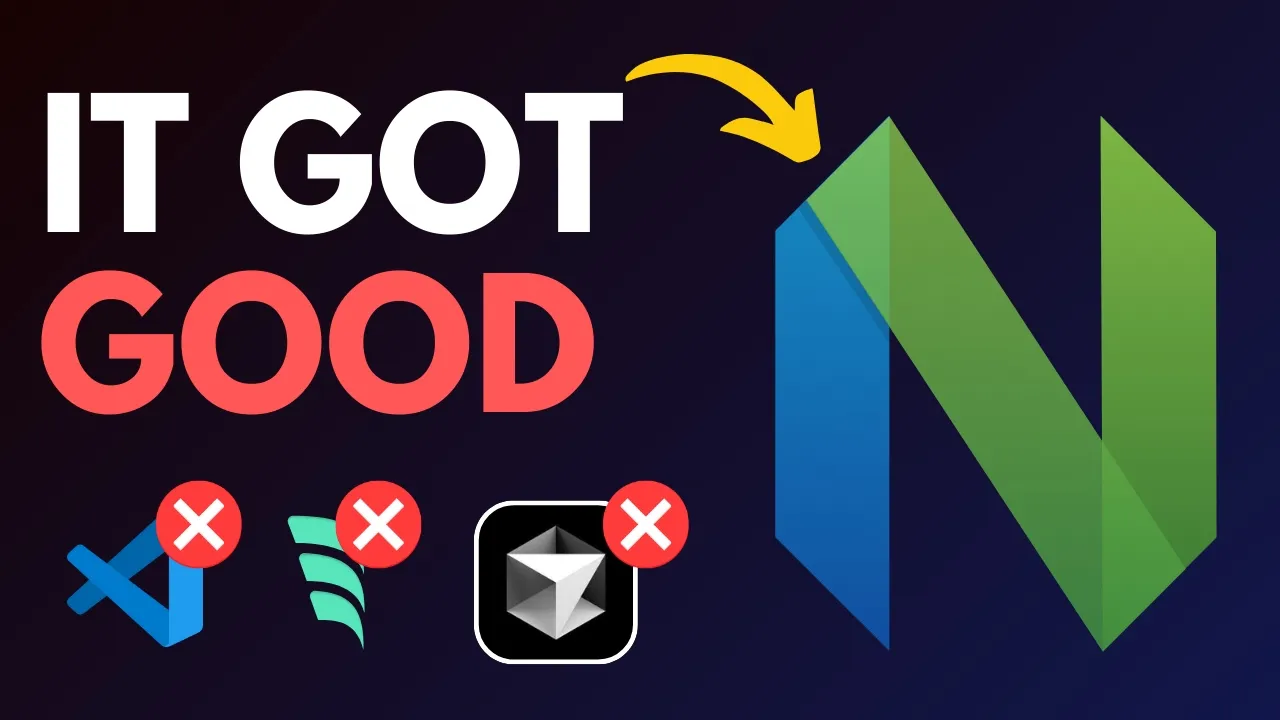
Neovim is often overlooked as a powerful platform for AI-assisted coding, with many developers gravitating toward newer GUI-based editors like Cursor AI. However, with the right plugins, this terminal-based editor can transform into an AI powerhouse that rivals—or even surpasses—dedicated AI coding editors. Let's explore five game-changing Neovim plugins that will revolutionize your development workflow with AI capabilities.
Why Consider Neovim for AI-Assisted Development?
Before diving into specific plugins, it's worth understanding why Neovim deserves consideration as your AI-powered editor of choice. As a terminal-based editor, Neovim offers unmatched customization, exceptional performance, and the ability to work seamlessly in remote environments. When enhanced with AI capabilities, it combines the efficiency of keyboard-driven workflows with the intelligence of modern AI coding assistants.

1. GitHub Copilot for Neovim: AI Suggestions on Your Terms
GitHub Copilot is the first essential plugin for transforming Neovim into an AI-powered editor. Unlike its implementation in other editors, Copilot in Neovim can be configured to add suggestions to the completion menu rather than inline with your code.
This approach gives you more control over when and how you accept AI suggestions, making the experience feel less intrusive and more intentional. You can review multiple suggestions and choose the one that best fits your needs, rather than feeling pressured to accept whatever is presented inline.
-- Example configuration for GitHub Copilot in Neovim
use {
'github/copilot.vim',
config = function()
vim.g.copilot_no_tab_map = true
vim.api.nvim_set_keymap('i', '<C-J>', 'copilot#Accept("\<CR>")', { expr = true, silent = true })
vim.g.copilot_filetypes = {
['*'] = true,
}
end
}2. Avante: Comprehensive AI Integration for Code Understanding
Avante is one of the most powerful AI plugins available for Neovim. It provides functionality similar to Cursor AI's chat interface, allowing you to interact with AI models to understand, modify, or generate code. What makes Avante particularly impressive is its ability to work with both individual files and entire codebases.
With Avante, you can:
- Ask questions about your code and receive contextual answers
- Request inline code modifications
- Generate new code blocks based on natural language descriptions
- Refactor existing code with AI assistance
- Get explanations of complex code patterns
Avante integrates smoothly with Neovim's interface, providing a chat-like experience without requiring you to leave your editor or context switch to a separate application.
3. Code Companion: A Powerful Alternative to Avante
While Avante is excellent, Code Companion is another impressive AI plugin worth considering. This newer addition to the Neovim ecosystem offers a robust set of features for AI-assisted coding, with strong community support and ongoing development.

Code Companion supports multiple AI adapters and offers a comprehensive set of features for code generation, refactoring, and understanding. It's designed to be lightweight yet powerful, making it an excellent choice for developers who want AI assistance without sacrificing editor performance.
-- Basic Code Companion setup
require('codecompanion').setup({
adapters = {
openai = {
api_key = os.getenv('OPENAI_API_KEY'),
model = 'gpt-4-turbo'
}
},
auto_follow_cursor = true,
display_mode = 'split'
})4. MCP Hub: Extending AI Capabilities with Custom Tools
Both Avante and Code Companion are powerful on their own, but MCP Hub takes AI integration in Neovim to the next level. This plugin connects your editor to an MCP (Multi-agent Conversational Protocol) server, unlocking powerful AI agent capabilities directly within your terminal.
With MCP Hub, you can leverage tools from the MCP server ecosystem, including Context 7, to give your AI assistants access to more sophisticated capabilities. This means your AI can not only understand your code but also perform complex operations like searching documentation, running tests, or even interacting with external APIs—all from within Neovim.
The integration between MCP Hub and plugins like Avante creates a seamless experience where you can prompt the AI and receive responses that leverage the full power of AI agents, not just basic language model capabilities.
5. Comment.nvim: Effortless Code Commenting
While AI capabilities are transformative, quality-of-life improvements are equally important for a productive coding environment. Comment.nvim is an essential plugin that simplifies one of the most common coding tasks: commenting code.
With Comment.nvim, you can:
- Comment out the current line with gcc
- Comment a selected block of code with gc in visual mode
- Comment multiple lines by combining gc with a number and direction (e.g., gc3j to comment 3 lines down)
These shortcuts work across all programming languages, with Comment.nvim automatically detecting the appropriate comment syntax. This plugin significantly improves coding efficiency, especially when combined with AI suggestions that may need to be temporarily commented out for testing or reference.
-- Comment.nvim setup
require('Comment').setup({
-- Enable line-wise commenting
toggler = {
line = 'gcc',
block = 'gbc',
},
-- Enable operator-pending mappings
opleader = {
line = 'gc',
block = 'gb',
}
})Bonus Plugins: Noice and Neo Scroll for a Polished Experience
To complete your Neovim transformation into a modern AI-powered editor, consider these two additional plugins that enhance the overall user experience:

- Noice: This plugin reimagines the Neovim command line, moving it to the center of the screen for better visibility and adding notification capabilities. While the notifications can sometimes be distracting, you can easily create custom keymaps to toggle them as needed.
- Neo Scroll: Replace Neovim's default jerky scrolling with smooth animations that make code navigation feel more natural and less disruptive to your concentration.
-- Smooth scrolling with Neo Scroll
require('neoscroll').setup({
-- Set a small easing effect
easing_function = 'quadratic',
-- How many lines to scroll at once
pre_hook = function() vim.wo.cursorline = false end,
post_hook = function() vim.wo.cursorline = true end
})
-- Custom keymap to toggle Noice notifications
vim.keymap.set('n', '<leader>tn', function()
require('noice').cmd('toggleNotifications')
end, { desc = 'Toggle notifications' })Getting Started with Neovim for AI-Assisted Development
If you're new to Neovim or intimidated by the setup process, consider starting with a pre-configured distribution like NvChad. This provides a solid foundation with many popular plugins already installed and configured, allowing you to focus on adding the AI-specific plugins mentioned above.
For VS Code users looking to transition to Neovim, NvChad offers a familiar aesthetic with modern features like a file explorer, fuzzy finding, and Git integration through plugins like nvim-tree, telescope, and lazygit.
Conclusion: Neovim as a Superior AI Coding Environment
With these five plugins—GitHub Copilot, Avante, Code Companion, MCP Hub, and Comment.nvim—plus the bonus additions of Noice and Neo Scroll, Neovim transforms from a powerful text editor into a comprehensive AI-assisted development environment that rivals or exceeds dedicated AI editors like Cursor.
The combination of Neovim's efficiency, customizability, and terminal-based workflow with cutting-edge AI capabilities creates a development experience that's both productive and enjoyable. Whether you're writing frontend code, developing backend systems, or working across the full stack, these plugins will help you leverage AI to write better code faster—all without leaving your terminal.
As AI continues to evolve, Neovim's plugin ecosystem ensures that your editor can evolve with it, making it a future-proof choice for developers who value both power and flexibility in their coding environment.
Let's Watch!
5 Neovim Plugins That Make It Better Than Cursor AI for Developers
Ready to enhance your neural network?
Access our quantum knowledge cores and upgrade your programming abilities.
Initialize Training Sequence